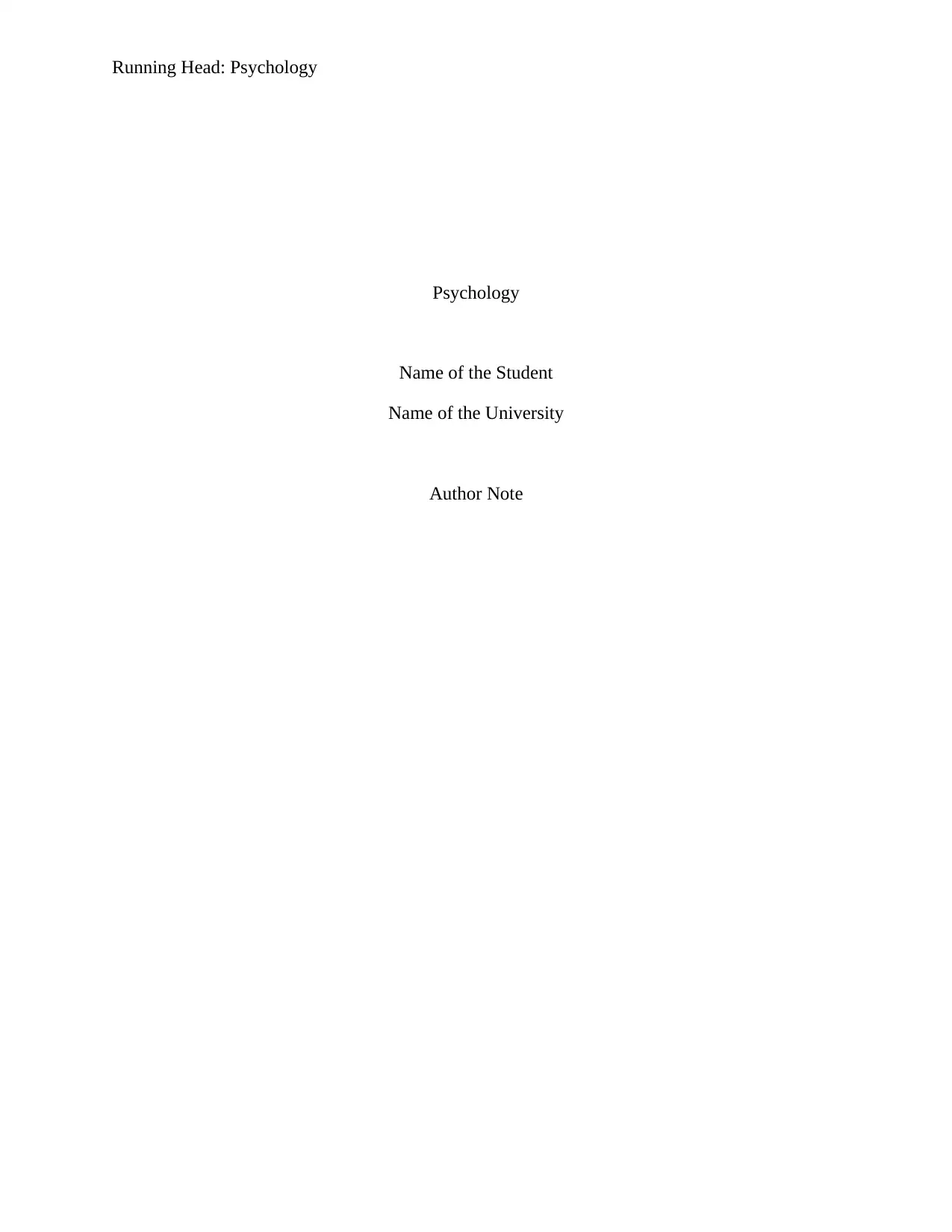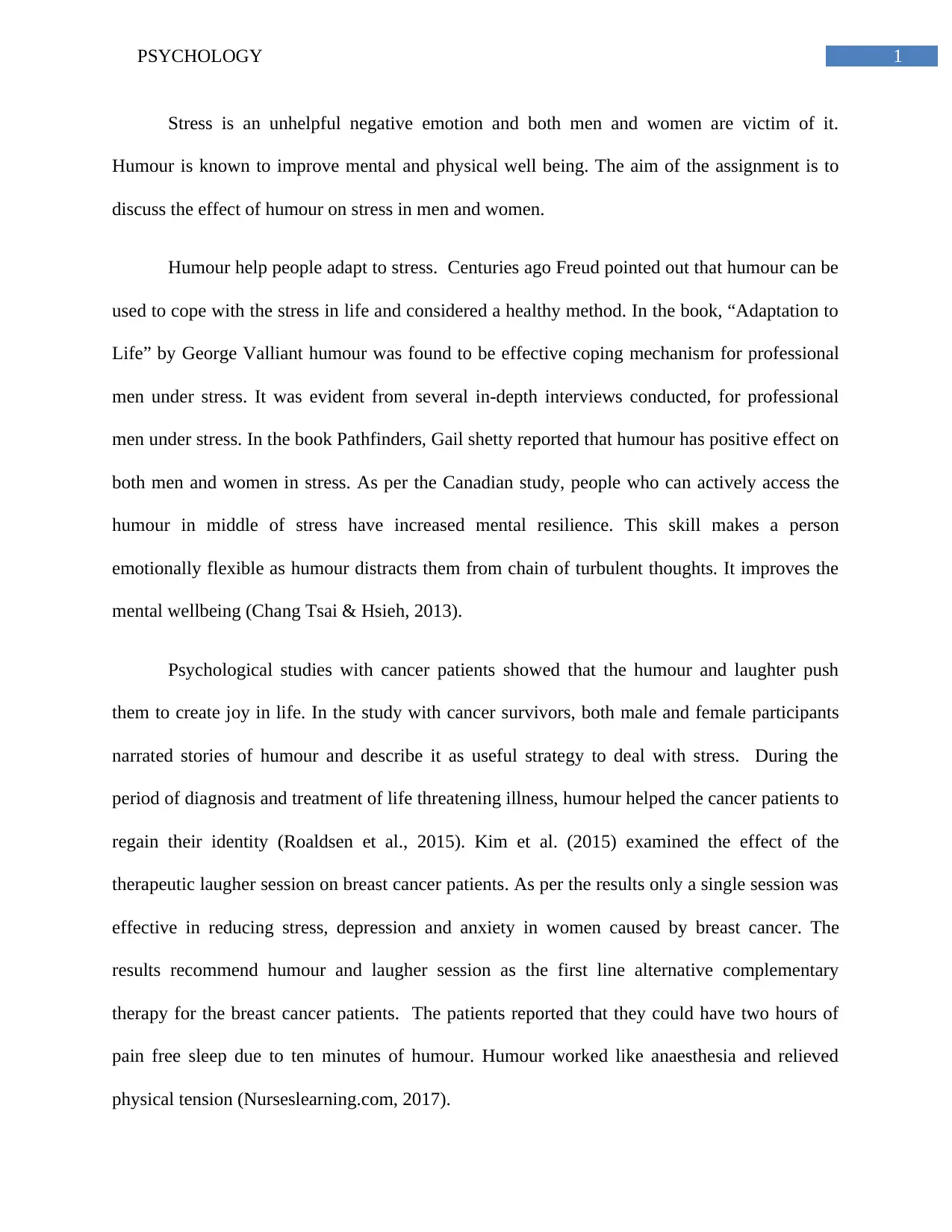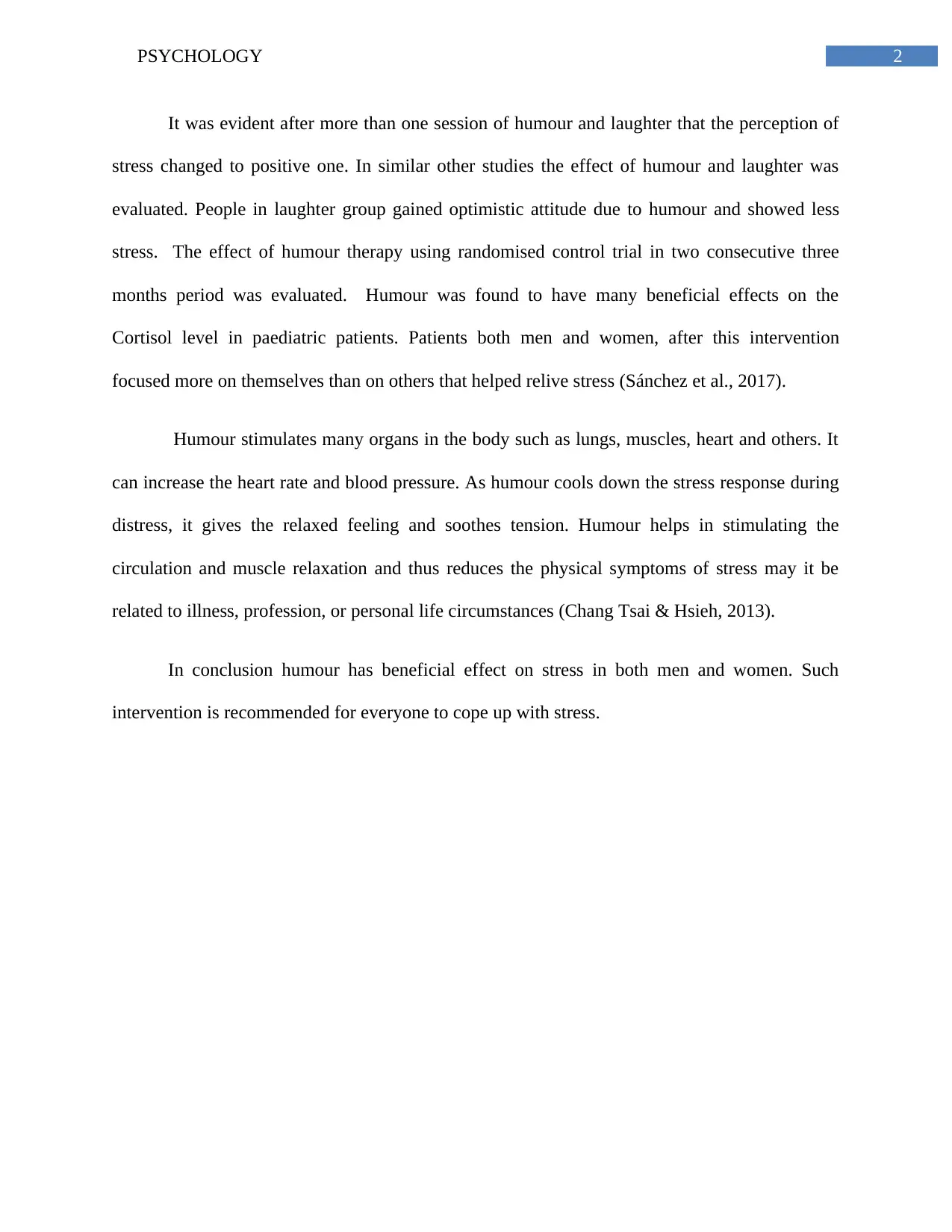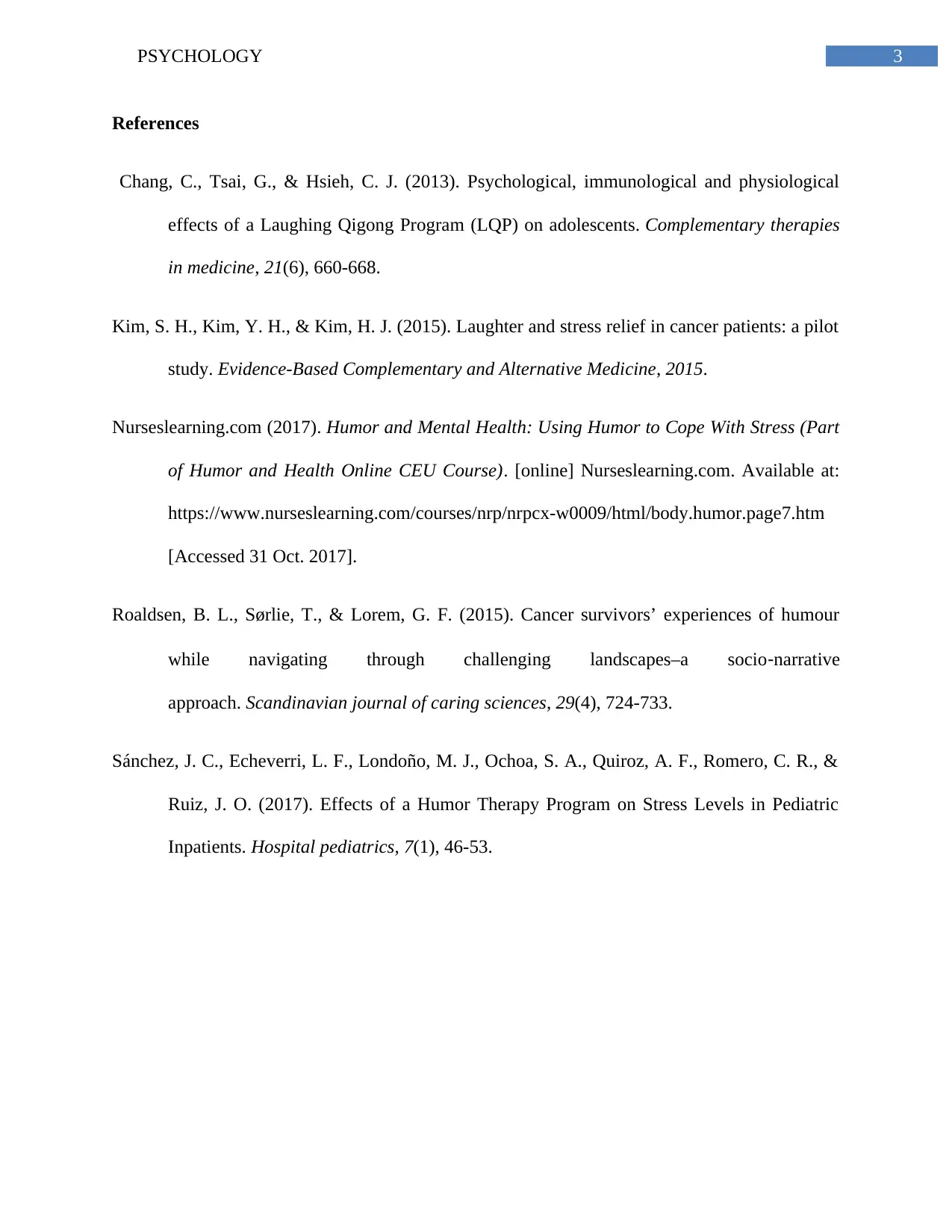Essay on Humour and Stress: A Psychological Perspective on Well-being
VerifiedAdded on 2020/04/21
|4
|845
|156
Essay
AI Summary
This psychology essay examines the effects of humour on stress in both men and women, drawing on research from various studies and authors. It explores how humour serves as a coping mechanism, as highlighted by Freud and others, and its positive impact on mental and physical well-being. The essay references studies showing that humour can improve mental resilience, emotional flexibility, and even reduce symptoms of stress and anxiety in cancer patients. It discusses the physiological effects of humour, such as stimulating organs and reducing tension. The conclusion emphasizes the beneficial role of humour in stress management and recommends its use for overall well-being.

Running Head: Psychology
Psychology
Name of the Student
Name of the University
Author Note
Psychology
Name of the Student
Name of the University
Author Note
Paraphrase This Document
Need a fresh take? Get an instant paraphrase of this document with our AI Paraphraser

1PSYCHOLOGY
Stress is an unhelpful negative emotion and both men and women are victim of it.
Humour is known to improve mental and physical well being. The aim of the assignment is to
discuss the effect of humour on stress in men and women.
Humour help people adapt to stress. Centuries ago Freud pointed out that humour can be
used to cope with the stress in life and considered a healthy method. In the book, “Adaptation to
Life” by George Valliant humour was found to be effective coping mechanism for professional
men under stress. It was evident from several in-depth interviews conducted, for professional
men under stress. In the book Pathfinders, Gail shetty reported that humour has positive effect on
both men and women in stress. As per the Canadian study, people who can actively access the
humour in middle of stress have increased mental resilience. This skill makes a person
emotionally flexible as humour distracts them from chain of turbulent thoughts. It improves the
mental wellbeing (Chang Tsai & Hsieh, 2013).
Psychological studies with cancer patients showed that the humour and laughter push
them to create joy in life. In the study with cancer survivors, both male and female participants
narrated stories of humour and describe it as useful strategy to deal with stress. During the
period of diagnosis and treatment of life threatening illness, humour helped the cancer patients to
regain their identity (Roaldsen et al., 2015). Kim et al. (2015) examined the effect of the
therapeutic laugher session on breast cancer patients. As per the results only a single session was
effective in reducing stress, depression and anxiety in women caused by breast cancer. The
results recommend humour and laugher session as the first line alternative complementary
therapy for the breast cancer patients. The patients reported that they could have two hours of
pain free sleep due to ten minutes of humour. Humour worked like anaesthesia and relieved
physical tension (Nurseslearning.com, 2017).
Stress is an unhelpful negative emotion and both men and women are victim of it.
Humour is known to improve mental and physical well being. The aim of the assignment is to
discuss the effect of humour on stress in men and women.
Humour help people adapt to stress. Centuries ago Freud pointed out that humour can be
used to cope with the stress in life and considered a healthy method. In the book, “Adaptation to
Life” by George Valliant humour was found to be effective coping mechanism for professional
men under stress. It was evident from several in-depth interviews conducted, for professional
men under stress. In the book Pathfinders, Gail shetty reported that humour has positive effect on
both men and women in stress. As per the Canadian study, people who can actively access the
humour in middle of stress have increased mental resilience. This skill makes a person
emotionally flexible as humour distracts them from chain of turbulent thoughts. It improves the
mental wellbeing (Chang Tsai & Hsieh, 2013).
Psychological studies with cancer patients showed that the humour and laughter push
them to create joy in life. In the study with cancer survivors, both male and female participants
narrated stories of humour and describe it as useful strategy to deal with stress. During the
period of diagnosis and treatment of life threatening illness, humour helped the cancer patients to
regain their identity (Roaldsen et al., 2015). Kim et al. (2015) examined the effect of the
therapeutic laugher session on breast cancer patients. As per the results only a single session was
effective in reducing stress, depression and anxiety in women caused by breast cancer. The
results recommend humour and laugher session as the first line alternative complementary
therapy for the breast cancer patients. The patients reported that they could have two hours of
pain free sleep due to ten minutes of humour. Humour worked like anaesthesia and relieved
physical tension (Nurseslearning.com, 2017).

2PSYCHOLOGY
It was evident after more than one session of humour and laughter that the perception of
stress changed to positive one. In similar other studies the effect of humour and laughter was
evaluated. People in laughter group gained optimistic attitude due to humour and showed less
stress. The effect of humour therapy using randomised control trial in two consecutive three
months period was evaluated. Humour was found to have many beneficial effects on the
Cortisol level in paediatric patients. Patients both men and women, after this intervention
focused more on themselves than on others that helped relive stress (Sánchez et al., 2017).
Humour stimulates many organs in the body such as lungs, muscles, heart and others. It
can increase the heart rate and blood pressure. As humour cools down the stress response during
distress, it gives the relaxed feeling and soothes tension. Humour helps in stimulating the
circulation and muscle relaxation and thus reduces the physical symptoms of stress may it be
related to illness, profession, or personal life circumstances (Chang Tsai & Hsieh, 2013).
In conclusion humour has beneficial effect on stress in both men and women. Such
intervention is recommended for everyone to cope up with stress.
It was evident after more than one session of humour and laughter that the perception of
stress changed to positive one. In similar other studies the effect of humour and laughter was
evaluated. People in laughter group gained optimistic attitude due to humour and showed less
stress. The effect of humour therapy using randomised control trial in two consecutive three
months period was evaluated. Humour was found to have many beneficial effects on the
Cortisol level in paediatric patients. Patients both men and women, after this intervention
focused more on themselves than on others that helped relive stress (Sánchez et al., 2017).
Humour stimulates many organs in the body such as lungs, muscles, heart and others. It
can increase the heart rate and blood pressure. As humour cools down the stress response during
distress, it gives the relaxed feeling and soothes tension. Humour helps in stimulating the
circulation and muscle relaxation and thus reduces the physical symptoms of stress may it be
related to illness, profession, or personal life circumstances (Chang Tsai & Hsieh, 2013).
In conclusion humour has beneficial effect on stress in both men and women. Such
intervention is recommended for everyone to cope up with stress.
⊘ This is a preview!⊘
Do you want full access?
Subscribe today to unlock all pages.

Trusted by 1+ million students worldwide

3PSYCHOLOGY
References
Chang, C., Tsai, G., & Hsieh, C. J. (2013). Psychological, immunological and physiological
effects of a Laughing Qigong Program (LQP) on adolescents. Complementary therapies
in medicine, 21(6), 660-668.
Kim, S. H., Kim, Y. H., & Kim, H. J. (2015). Laughter and stress relief in cancer patients: a pilot
study. Evidence-Based Complementary and Alternative Medicine, 2015.
Nurseslearning.com (2017). Humor and Mental Health: Using Humor to Cope With Stress (Part
of Humor and Health Online CEU Course). [online] Nurseslearning.com. Available at:
https://www.nurseslearning.com/courses/nrp/nrpcx-w0009/html/body.humor.page7.htm
[Accessed 31 Oct. 2017].
Roaldsen, B. L., Sørlie, T., & Lorem, G. F. (2015). Cancer survivors’ experiences of humour
while navigating through challenging landscapes–a socio‐narrative
approach. Scandinavian journal of caring sciences, 29(4), 724-733.
Sánchez, J. C., Echeverri, L. F., Londoño, M. J., Ochoa, S. A., Quiroz, A. F., Romero, C. R., &
Ruiz, J. O. (2017). Effects of a Humor Therapy Program on Stress Levels in Pediatric
Inpatients. Hospital pediatrics, 7(1), 46-53.
References
Chang, C., Tsai, G., & Hsieh, C. J. (2013). Psychological, immunological and physiological
effects of a Laughing Qigong Program (LQP) on adolescents. Complementary therapies
in medicine, 21(6), 660-668.
Kim, S. H., Kim, Y. H., & Kim, H. J. (2015). Laughter and stress relief in cancer patients: a pilot
study. Evidence-Based Complementary and Alternative Medicine, 2015.
Nurseslearning.com (2017). Humor and Mental Health: Using Humor to Cope With Stress (Part
of Humor and Health Online CEU Course). [online] Nurseslearning.com. Available at:
https://www.nurseslearning.com/courses/nrp/nrpcx-w0009/html/body.humor.page7.htm
[Accessed 31 Oct. 2017].
Roaldsen, B. L., Sørlie, T., & Lorem, G. F. (2015). Cancer survivors’ experiences of humour
while navigating through challenging landscapes–a socio‐narrative
approach. Scandinavian journal of caring sciences, 29(4), 724-733.
Sánchez, J. C., Echeverri, L. F., Londoño, M. J., Ochoa, S. A., Quiroz, A. F., Romero, C. R., &
Ruiz, J. O. (2017). Effects of a Humor Therapy Program on Stress Levels in Pediatric
Inpatients. Hospital pediatrics, 7(1), 46-53.
1 out of 4
Related Documents
Your All-in-One AI-Powered Toolkit for Academic Success.
+13062052269
info@desklib.com
Available 24*7 on WhatsApp / Email
![[object Object]](/_next/static/media/star-bottom.7253800d.svg)
Unlock your academic potential
Copyright © 2020–2026 A2Z Services. All Rights Reserved. Developed and managed by ZUCOL.





